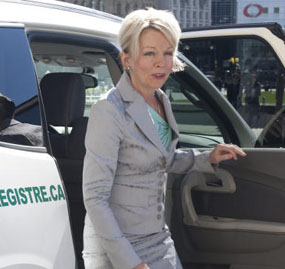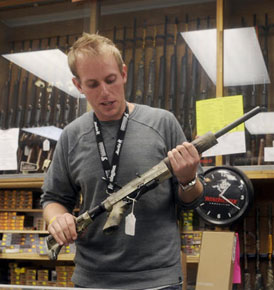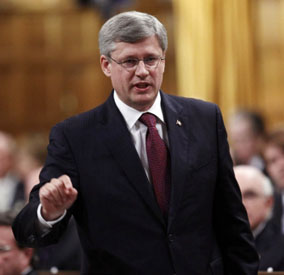What’s at stake in next Canadian federal election could also be future of Canada?
Sep 21st, 2010 | By Randall White | Category: In Brief
Candice Hoeppner arrives on Parliament Hill in an SUV trimmed with signs that say “Scrap the Long-Gun Registry” (in both English and French), Monday, September 20, 2010.
[UPDATED SEPTEMBER 22, 11 PM ET]. There is still probably a small question mark beside the fate of the long gun registry in the Canadian House of Commons on Wednesday, September 22, sometime after 5:30 PM ET.
But as the Globe and Mail has reported, assuming no further surprises between now and then, the decision of Nova Scotia New Democrat MP Peter Stoffer to change his mind, in response to his constituents’ wishes, “means that opposition parties will be able to end debate by a vote of 153-151 this week on a Conservative private-member’s bill to shutter the registry.”
(Or, as the Chronicle Herald in Halifax has put it: “Manitoba Tory MP Candice Hoeppner conceded Monday that with another New Democrat pledging to vote in favour of keeping the program, her bill is likely dead.” And, in fact, as of 11 PM ET September 22, everything has happened as predicted: see, eg, “Gun registry survives in 153-151 Commons vote” in the Calgary Herald.)

Walter Boeswald, a life-long hunter and employee at Ramakko's outdoor store in Sudbury, Ontario, examines a long gun on the job, September 14, 2010.
As even the Toronto Star recognizes: “There has been speculation that [PM] Harper actually wants this bill defeated because then the Conservatives can campaign on it against rural New Democrats and Liberals in the next election.” Star editorialists have concluded that “this is too clever by half.” But if you look at the latest Angus Reid poll on the subject, you just might conclude that too clever by half could be close enough for jazz.
A clear and decisive majority of the Canadian people is opposed to “scrapping the long gun registry” only in Quebec. A clear majority does want to scrap the thing (just like Stephen Harper from Alberta) in all four provinces of Western Canada (and especially in the three Prairie provinces). Ontario and especially Atlantic Canada are somewhere in between.
As reported in the Vancouver Sun, the almost-cute-as-a-button Ms. Hoeppner herself has declared: “I’m telling people if you want the registry scrapped, you need to vote in a Conservative member of Parliament in your riding and certainly if you get a majority of members of Parliament who are Conservative, that’s what we will do.” (Or, again, as Le Devoir has explained in the other official language: “Registre des armes à feu – Harper met l’opposition en garde … Renier sa promesse électorale pourrait coûter des votes, dit-il.” And in the wake of the actual vote on September 22, see “Harper takes tactical advantage as bid to scuttle gun registry fails: Pollsters” in the Vancouver Sun, and in the Globe and Mail : “Tories aim to turn long-gun defeat into victory … Conservatives eye ridings of vote-switching Liberal and NDP MPs in search for elusive majority.”)

“Stephen Harper lors de la période de questions, hier. Photo : Agence Reuters Chris Wattie.” Does he really look kinder and gentler in glasses?
Broadening the scenario somewhat, just this afternoon in “a luncheon speech to a business audience at Ottawa’s Chateau Laurier, Finance Minister Jim Flaherty … said his government does not want an election now because it will put at risk Canada’s economic recovery, yet it is clear from his speech the campaigning is already under way … ‘Under an Ignatieff-NDP-Bloc Québécois government, nothing would be safe,’ Mr. Flaherty told a Canada Club business audience. ‘No part of our economy would be spared. No taxpayer would avoid the hit.’” (Or as Le Devoir explained on September 22: “Soudaine odeur électorale à Ottawa – Jim Flaherty prononce une allocution provocatrice aux allures de discours de campagne.”)
A less rabid version of this argument seems to have been outlined recently by the eminent and excellent John Ibbitson: “Most federal elections hinge on the simple question: Who do you trust to mind the store? The next election, however, will also be fought over an issue: Should the federal government cut spending to fight the deficit, or should it protect programs and let debt continue to pile up?”
It is easy enough to see why the Harper Conservatives might want this to be the main ground on which the next election is fought. (Even if they are not really the deficit fighters they pretend to be themselves.) But the emerging alternative progressive coalition (or accord, or quasi-alliance, or free and democratic market-driven co-operative public-private partnership, etc) – whoever and whatever it may finally involve (and the latest Harris-Decima poll suggests that Mr. Flaherty and others still may not be paying enough attention to the Green Party of Canada, eg) – could finally choose another kind of ground.
And who knows? That just might be close enough for jazz too?

Former Montreal Canadiens and Edmonton Oilers enforcer, Georges Laraque is now deputy leader of the Green Party of Canada.
On a rough initial formulation, the next election may also be fought over the fundamental issue of the future of Canada. Do the Canadian people, from coast to coast to coast (and in both official languages, among all visible minorities, rural and urban dwellers, and on all first-nations reserves), really want to give a majority or even another minority government to a man who “may have shown his real feelings about Canada in 2000 when he called it ‘a second-tier socialistic country’”?
Can any broad swath of the present-day country’s diverse population finally trust a political party dominated by one or at best two provinces, that is currently “running on empty” with no “compelling agenda” (beyond what all too often looks a bit too much like blatantly irrational fear-mongering – which too aggressively disrespects the intelligence of the average voter)?


[…] This post was mentioned on Twitter by Counterweights and Counterweights , Martell Thornton. Martell Thornton said: What's at stake in next Canadian federal election could also be …: A less rabid version of this argument seems t… http://bit.ly/9GwdDP […]
http://topsy.com/www.counterweights.ca/2010/09/what%E2%80%99s-at-stake-in-next-canadian-federal-election-could-also-be-the-future-of-canada/?utm_source=pingback&utm_campaign=L2